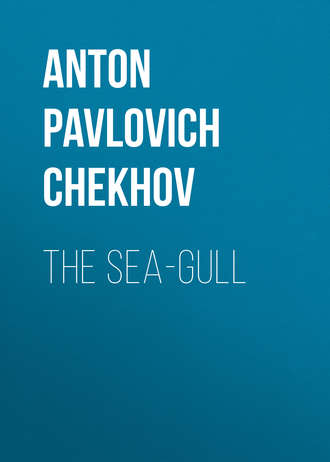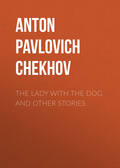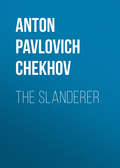
Антон Чехов
The Sea-Gull
ARKADINA. You are very kind, Paulina.
PAULINA. Good-bye, my dearie. If things have not been quite as you could have wished, please forgive us. [She weeps.]
ARKADINA. It has been delightful, delightful. You mustn’t cry.
SORIN comes in through the door on the left, dressed in a long coat with a cape, and carrying his hat and cane. He crosses the room.
SORIN. Come, sister, it is time to start, unless you want to miss the train. I am going to get into the carriage. [He goes out.]
MEDVIEDENKO. I shall walk quickly to the station and see you off there. [He goes out.]
ARKADINA. Good-bye, all! We shall meet again next summer if we live. [The maid servant, JACOB, and the cook kiss her hand] Don’t forget me. [She gives the cook a rouble] There is a rouble for all three of you.
THE COOK. Thank you, mistress; a pleasant journey to you.
JACOB. God bless you, mistress.
SHAMRAEFF. Send us a line to cheer us up. [TO TRIGORIN] Good-bye, sir.
ARKADINA. Where is Constantine? Tell him I am starting. I must say good-bye to him. [To JACOB] I gave the cook a rouble for all three of you.
All go out through the door on the right. The stage remains empty. Sounds of farewell are heard. The maid comes running back to fetch the basket of plums which has been forgotten. TRIGORIN comes back.
TRIGORIN. I had forgotten my cane. I think I left it on the terrace. [He goes toward the door on the right and meets NINA, who comes in at that moment] Is that you? We are off.
NINA. I knew we should meet again. [With emotion] I have come to an irrevocable decision, the die is cast: I am going on the stage. I am deserting my father and abandoning everything. I am beginning life anew. I am going, as you are, to Moscow. We shall meet there.
TRIGORIN. [Glancing about him] Go to the Hotel Slavianski Bazar. Let me know as soon as you get there. I shall be at the Grosholski House in Moltchanofka Street. I must go now. [A pause.]
NINA. Just one more minute!
TRIGORIN. [In a low voice] You are so beautiful! What bliss to think that I shall see you again so soon! [She sinks on his breast] I shall see those glorious eyes again, that wonderful, ineffably tender smile, those gentle features with their expression of angelic purity! My darling! [A prolonged kiss.]
The curtain falls
Two years elapse between the third and fourth acts
ACT IV
A sitting-room in SORIN’S house, which has been converted into a writing-room for TREPLIEFF. To the right and left are doors leading into inner rooms, and in the centre is a glass door opening onto a terrace. Besides the usual furniture of a sitting-room there is a writing-desk in the right-hand corner of the room. There is a Turkish divan near the door on the left, and shelves full of books stand against the walls. Books are lying scattered about on the windowsills and chairs. It is evening. The room is dimly lighted by a shaded lamp on a table. The wind moans in the tree tops and whistles down the chimney. The watchman in the garden is heard sounding his rattle. MEDVIEDENKO and MASHA come in
MASHA. [Calling TREPLIEFF] Mr. Constantine, where are you? [Looking about her] There is no one here. His old uncle is forever asking for Constantine, and can’t live without him for an instant.
MEDVIEDENKO. He dreads being left alone. [Listening to the wind] This is a wild night. We have had this storm for two days.
MASHA. [Turning up the lamp] The waves on the lake are enormous.
MEDVIEDENKO. It is very dark in the garden. Do you know, I think that old theatre ought to be knocked down. It is still standing there, naked and hideous as a skeleton, with the curtain flapping in the wind. I thought I heard a voice weeping in it as I passed there last night.
MASHA. What an idea! [A pause.]
MEDVIEDENKO. Come home with me, Masha.
MASHA. [Shaking her head] I shall spend the night here.
MEDVIEDENKO. [Imploringly] Do come, Masha. The baby must be hungry.
MASHA. Nonsense, Matriona will feed it. [A pause.]
MEDVIEDENKO. It is a pity to leave him three nights without his mother.
MASHA. You are getting too tiresome. You used sometimes to talk of other things besides home and the baby, home and the baby. That is all I ever hear from you now.
MEDVIEDENKO. Come home, Masha.
MASHA. You can go home if you want to.
MEDVIEDENKO. Your father won’t give me a horse.
MASHA. Yes, he will; ask him.
MEDVIEDENKO. I think I shall. Are you coming home to-morrow?
MASHA. Yes, yes, to-morrow.
She takes snuff. TREPLIEFF and PAULINA come in. TREPLIEFF is carrying some pillows and a blanket, and PAULINA is carrying sheets and pillow cases. They lay them on the divan, and TREPLIEFF goes and sits down at his desk.
MASHA. Who is that for, mother?
PAULINA. Mr. Sorin asked to sleep in Constantine’s room to-night.
MASHA. Let me make the bed.
She makes the bed. PAULINA goes up to the desk and looks at the manuscripts lying on it. [A pause.]
MEDVIEDENKO. Well, I am going. Good-bye, Masha. [He kisses his wife’s hand] Good-bye, mother. [He tries to kiss his mother-in-law’s hand.]
PAULINA. [Crossly] Be off, in God’s name!
TREPLIEFF shakes hands with him in silence, and MEDVIEDENKO goes out.
PAULINA. [Looking at the manuscripts] No one ever dreamed, Constantine, that you would one day turn into a real author. The magazines pay you well for your stories. [She strokes his hair.] You have grown handsome, too. Dear, kind Constantine, be a little nicer to my Masha.
MASHA. [Still making the bed] Leave him alone, mother.
PAULINA. She is a sweet child. [A pause] A woman, Constantine, asks only for kind looks. I know that from experience.
TREPLIEFF gets up from his desk and goes out without a word.
MASHA. There now! You have vexed him. I told you not to bother him.
PAULINA. I am sorry for you, Masha.
MASHA. Much I need your pity!
PAULINA. My heart aches for you. I see how things are, and understand.
MASHA. You see what doesn’t exist. Hopeless love is only found in novels. It is a trifle; all one has to do is to keep a tight rein on oneself, and keep one’s head clear. Love must be plucked out the moment it springs up in the heart. My husband has been promised a school in another district, and when we have once left this place I shall forget it all. I shall tear my passion out by the roots. [The notes of a melancholy waltz are heard in the distance.]
PAULINA. Constantine is playing. That means he is sad.
MASHA silently waltzes a few turns to the music.
MASHA. The great thing, mother, is not to have him continually in sight. If my Simon could only get his remove I should forget it all in a month or two. It is a trifle.
DORN and MEDVIEDENKO come in through the door on the left, wheeling SORIN in an arm-chair.
MEDVIEDENKO. I have six mouths to feed now, and flour is at seventy kopecks.
DORN. A hard riddle to solve!
MEDVIEDENKO. It is easy for you to make light of it. You are rich enough to scatter money to your chickens, if you wanted to.
DORN. You think I am rich? My friend, after practising for thirty years, during which I could not call my soul my own for one minute of the night or day, I succeeded at last in scraping together one thousand roubles, all of which went, not long ago, in a trip which I took abroad. I haven’t a penny.
MASHA. [To her husband] So you didn’t go home after all?
MEDVIEDENKO. [Apologetically] How can I go home when they won’t give me a horse?
MASHA. [Under her breath, with bitter anger] Would I might never see your face again!
SORIN in his chair is wheeled to the left-hand side of the room. PAULINA, MASHA, and DORN sit down beside him. MEDVIEDENKO stands sadly aside.
DORN. What a lot of changes you have made here! You have turned this sitting-room into a library.
MASHA. Constantine likes to work in this room, because from it he can step out into the garden to meditate whenever he feels like it. [The watchman’s rattle is heard.]
SORIN. Where is my sister?
DORN. She has gone to the station to meet Trigorin. She will soon be back.
SORIN. I must be dangerously ill if you had to send for my sister. [He falls silent for a moment] A nice business this is! Here I am dangerously ill, and you won’t even give me any medicine.
DORN. What shall I prescribe for you? Camomile tea? Soda? Quinine?
SORIN. Don’t inflict any of your discussions on me again. [He nods toward the sofa] Is that bed for me?
PAULINA. Yes, for you, sir.
SORIN. Thank you.
DORN. [Sings] “The moon swims in the sky to-night.”
SORIN. I am going to give Constantine an idea for a story. It shall be called “The Man Who Wished – L’Homme qui a voulu.” When I was young, I wished to become an author; I failed. I wished to be an orator; I speak abominably, [Exciting himself] with my eternal “and all, and all,” dragging each sentence on and on until I sometimes break out into a sweat all over. I wished to marry, and I didn’t; I wished to live in the city, and here I am ending my days in the country, and all.
DORN. You wished to become State Councillor, and – you are one!
SORIN. [Laughing] I didn’t try for that, it came of its own accord.
DORN. Come, you must admit that it is petty to cavil at life at sixty-two years of age.
SORIN. You are pig-headed! Can’t you see I want to live?
DORN. That is futile. Nature has commanded that every life shall come to an end.
SORIN. You speak like a man who is satiated with life. Your thirst for it is quenched, and so you are calm and indifferent, but even you dread death.
DORN. The fear of death is an animal passion which must be overcome. Only those who believe in a future life and tremble for sins committed, can logically fear death; but you, for one thing, don’t believe in a future life, and for another, you haven’t committed any sins. You have served as a Councillor for twenty-five years, that is all.
SORIN. [Laughing] Twenty-eight years!
TREPLIEFF comes in and sits down on a stool at SORIN’S feet. MASHA fixes her eyes on his face and never once tears them away.
DORN. We are keeping Constantine from his work.
TREPLIEFF. No matter. [A pause.]
MEDVIEDENKO. Of all the cities you visited when you were abroad, Doctor, which one did you like the best?
DORN. Genoa.
TREPLIEFF. Why Genoa?
DORN. Because there is such a splendid crowd in its streets. When you leave the hotel in the evening, and throw yourself into the heart of that throng, and move with it without aim or object, swept along, hither and thither, their life seems to be yours, their soul flows into you, and you begin to believe at last in a great world spirit, like the one in your play that Nina Zarietchnaya acted. By the way, where is Nina now? Is she well?
TREPLIEFF. I believe so.
DORN. I hear she has led rather a strange life; what happened?
TREPLIEFF. It is a long story, Doctor.
DORN. Tell it shortly. [A pause.]
TREPLIEFF. She ran away from home and joined Trigorin; you know that?
DORN. Yes.
TREPLIEFF. She had a child that died. Trigorin soon tired of her and returned to his former ties, as might have been expected. He had never broken them, indeed, but out of weakness of character had always vacillated between the two. As far as I can make out from what I have heard, Nina’s domestic life has not been altogether a success.
DORN. What about her acting?
TREPLIEFF. I believe she made an even worse failure of that. She made her debut on the stage of the Summer Theatre in Moscow, and afterward made a tour of the country towns. At that time I never let her out of my sight, and wherever she went I followed. She always attempted great and difficult parts, but her delivery was harsh and monotonous, and her gestures heavy and crude. She shrieked and died well at times, but those were but moments.
DORN. Then she really has a talent for acting?
TREPLIEFF. I never could make out. I believe she has. I saw her, but she refused to see me, and her servant would never admit me to her rooms. I appreciated her feelings, and did not insist upon a meeting. [A pause] What more can I tell you? She sometimes writes to me now that I have come home, such clever, sympathetic letters, full of warm feeling. She never complains, but I can tell that she is profoundly unhappy; not a line but speaks to me of an aching, breaking nerve. She has one strange fancy; she always signs herself “The Sea-gull.” The miller in “Rusalka” called himself “The Crow,” and so she repeats in all her letters that she is a sea-gull. She is here now.
DORN. What do you mean by “here?”
TREPLIEFF. In the village, at the inn. She has been there for five days. I should have gone to see her, but Masha here went, and she refuses to see any one. Some one told me she had been seen wandering in the fields a mile from here yesterday evening.
MEDVIEDENKO. Yes, I saw her. She was walking away from here in the direction of the village. I asked her why she had not been to see us. She said she would come.
TREPLIEFF. But she won’t. [A pause] Her father and stepmother have disowned her. They have even put watchmen all around their estate to keep her away. [He goes with the doctor toward the desk] How easy it is, Doctor, to be a philosopher on paper, and how difficult in real life!
SORIN. She was a beautiful girl. Even the State Councillor himself was in love with her for a time.
DORN. You old Lovelace, you!
SHAMRAEFF’S laugh is heard.
PAULINA. They are coming back from the station.
TREPLIEFF. Yes, I hear my mother’s voice.
ARKADINA and TRIGORIN come in, followed by SHAMRAEFF.
SHAMRAEFF. We all grow old and wither, my lady, while you alone, with your light dress, your gay spirits, and your grace, keep the secret of eternal youth.
ARKADINA. You are still trying to turn my head, you tiresome old man.
TRIGORIN. [To SORIN] How do you do, Peter? What, still ill? How silly of you! [With evident pleasure, as he catches sight of MASHA] How are you, Miss Masha?
MASHA. So you recognised me? [She shakes hands with him.]
TRIGORIN. Did you marry him?
MASHA. Long ago.
TRIGORIN. You are happy now? [He bows to DORN and MEDVIEDENKO, and then goes hesitatingly toward TREPLIEFF] Your mother says you have forgotten the past and are no longer angry with me.
TREPLIEFF gives him his hand.
ARKADINA. [To her son] Here is a magazine that Boris has brought you with your latest story in it.
TREPLIEFF. [To TRIGORIN, as he takes the magazine] Many thanks; you are very kind.
TRIGORIN. Your admirers all send you their regards. Every one in Moscow and St. Petersburg is interested in you, and all ply me with questions about you. They ask me what you look like, how old you are, whether you are fair or dark. For some reason they all think that you are no longer young, and no one knows who you are, as you always write under an assumed name. You are as great a mystery as the Man in the Iron Mask.
TREPLIEFF. Do you expect to be here long?
TRIGORIN. No, I must go back to Moscow to-morrow. I am finishing another novel, and have promised something to a magazine besides. In fact, it is the same old business.
During their conversation ARKADINA and PAULINA have put up a card-table in the centre of the room; SHAMRAEFF lights the candles and arranges the chairs, then fetches a box of lotto from the cupboard.
TRIGORIN. The weather has given me a rough welcome. The wind is frightful. If it goes down by morning I shall go fishing in the lake, and shall have a look at the garden and the spot – do you remember? – where your play was given. I remember the piece very well, but should like to see again where the scene was laid.
MASHA. [To her father] Father, do please let my husband have a horse. He ought to go home.
SHAMRAEFF. [Angrily] A horse to go home with! [Sternly] You know the horses have just been to the station. I can’t send them out again.
MASHA. But there are other horses. [Seeing that her father remains silent] You are impossible!
MEDVIEDENKO. I shall go on foot, Masha.
PAULINA. [With a sigh] On foot in this weather? [She takes a seat at the card-table] Shall we begin?
MEDVIEDENKO. It is only six miles. Good-bye. [He kisses his wife’s hand;] Good-bye, mother. [His mother-in-law gives him her hand unwillingly] I should not have troubled you all, but the baby – [He bows to every one] Good-bye. [He goes out with an apologetic air.]
SHAMRAEFF. He will get there all right, he is not a major-general.
PAULINA. Come, let us begin. Don’t let us waste time, we shall soon be called to supper.
SHAMRAEFF, MASHA, and DORN sit down at the card-table.
ARKADINA. [To TRIGORIN] When the long autumn evenings descend on us we while away the time here by playing lotto. Look at this old set; we used it when our mother played with us as children. Don’t you want to take a hand in the game with us until supper time? [She and TRIGORIN sit down at the table] It is a monotonous game, but it is all right when one gets used to it. [She deals three cards to each of the players.]
TREPLIEFF. [Looking through the pages of the magazine] He has read his own story, and hasn’t even cut the pages of mine.
He lays the magazine on his desk and goes toward the door on the right, stopping as he passes his mother to give her a kiss.
ARKADINA. Won’t you play, Constantine?
TREPLIEFF. No, excuse me please, I don’t feel like it. I am going to take a turn through the rooms. [He goes out.]
MASHA. Are you all ready? I shall begin: twenty-two.
ARKADINA. Here it is.
MASHA. Three.
DORN. Right.
MASHA. Have you put down three? Eight. Eighty-one. Ten.
SHAMRAEFF. Don’t go so fast.
ARKADINA. Could you believe it? I am still dazed by the reception they gave me in Kharkoff.
MASHA. Thirty-four. [The notes of a melancholy waltz are heard.]
ARKADINA. The students gave me an ovation; they sent me three baskets of flowers, a wreath, and this thing here.
She unclasps a brooch from her breast and lays it on the table.
SHAMRAEFF. There is something worth while!
MASHA. Fifty.
DORN. Fifty, did you say?
ARKADINA. I wore a perfectly magnificent dress; I am no fool when it comes to clothes.
PAULINA. Constantine is playing again; the poor boy is sad.
SHAMRAEFF. He has been severely criticised in the papers.
MASHA. Seventy-seven.
ARKADINA. They want to attract attention to him.
TRIGORIN. He doesn’t seem able to make a success, he can’t somehow strike the right note. There is an odd vagueness about his writings that sometimes verges on delirium. He has never created a single living character.
MASHA. Eleven.
ARKADINA. Are you bored, Peter? [A pause] He is asleep.
DORN. The Councillor is taking a nap.
MASHA. Seven. Ninety.
TRIGORIN. Do you think I should write if I lived in such a place as this, on the shore of this lake? Never! I should overcome my passion, and give my life up to the catching of fish.







